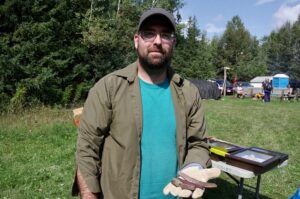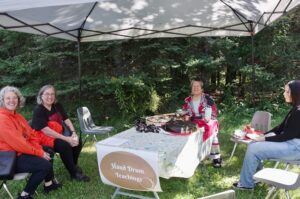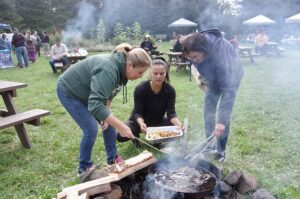Lakehead University’s Fall Harvest showcases traditional Indigenous teachings

By Rick Garrick
THUNDER BAY — Copper technology predating the Bronze Age was highlighted by Department of Anthropology staff during Lakehead University’s Fall Harvest, held Sept. 16 at the Sweat Lodge Site on the Thunder Bay campus.
“The key thing that most people don’t realize is we have 13 archaeological sites here on campus and they range anywhere between 4,000 and 7,000-years-old, and on those sites, we have chip stone technology, we have ground stone technology as well as copper,” says Clarence Surette, archaeologist and technician with the Department of Anthropology at Lakehead University. “The thing that most people kind of find fascinating is that most people don’t know that copper use is older here than anywhere else in the world. People talk about the Bronze Age in Europe, well in this area here, people were making use of copper way before anybody else was in those areas.”
Surette says people used to pound raw native copper from the area into the tools they needed.
“Copper from this area made it all the way down to the Gulf of Mexico, all the way to the east coast, the west coast, it made it all over the place,” Surette says.
The Fall Harvest also featured a variety of cultural teachings from Elders as well as traditional foods such as geese, moose, sturgeon, and walleye, and teas and bannock.

Biigtigong Nishnaabeg Elder Beatrice Twance-Hynes, a member of Lakehead University’s Elders Council, shared some of her hand drum teachings and songs during the Fall Harvest.
“It’s really nice to bring my drums here and my sacred items and to share those teachings with others,” Twance-Hynes says, noting that she got her first drum in 1999. “I’ve learned so much since then and I’m really fortunate to be able to share the teachings of the drum. I’m really grateful to one of my mentors, Freda McDonald, she’s now in the Spirit World. She taught me so much about the drum and she used to drum with us and translate the songs for us, so I’m really grateful for her and for all that I have learned about the drums over the years.”
Fort William Elder Sheila DeCorte, a member of Lakehead University’s Elders Council, says many people visited her booth to learn about the water during the Fall Harvest.
“I spoke on behalf of the water and spoke about my experience as a Water Walker and the importance of protecting and caring for the water and what people could do to do their part to ensure safe drinking water for our generation and future generations to come,” DeCorte says. “I picked up water from the McIntyre River this morning with my copper pail, so I invited people to put their good intentions and their prayers … into that water and offer the semaa (tobacco).”

Gillian Siddall, president and vice-chancellor at Lakehead University, says the food was amazing at the Fall Harvest.
“I had a moose soup made by one of the Elders of Lakehead University (Elder Charlotte Kwandibens) that she said was her mother’s recipe that she’s been making for many years,” Siddall says. “I also really loved to hear some of the other Elders that are part of our Elders Council here share their teachings around Water Walking and drum-making. It’s just been a wonderful day and a beautiful day for this event.”
Denise Baxter, vice provost Indigenous Initiatives at Lakehead University, says they were pleased with the number of people from the community and the high school students who visited during the Fall Harvest.
“People were really excited to try the different kinds of traditional foods to this region and certainly some of the traditional teaching areas were just full of people listening and talking to our Water Walker, our hand drummer and learning about our sweat lodge,” Baxter says. “And a lot of people thought it was really cool to be taking the hair and flesh off a moose hide and pulling porcupine quills because it’s not something you get to do every day.”


